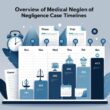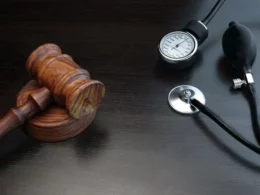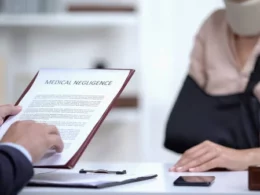Whiplash is a common injury sustained in car accidents, typically resulting from the sudden jolt of a vehicle during a collision. This type of injury can cause various symptoms such as neck pain, stiffness, and decreased range of motion. The process of claiming compensation for whiplash can be straightforward in cases where another party is at fault. However, the question arises – can you claim whiplash if the crash was your fault?
Understanding the legal and medical aspects of whiplash claims is essential in determining your eligibility for compensation. When you are deemed at fault in a car accident, it may be more challenging to seek a claim for your injuries. It is crucial to evaluate the circumstances of the accident, the extent of your injury, and your responsibility in the crash to ascertain if you can still claim compensation for whiplash.
Key Takeaways
- Whiplash injuries may lead to compensation claims, depending on the accident circumstances.
- Legal and medical evaluations are crucial in determining eligibility for compensation.
- At-fault individuals may face challenges when seeking a whiplash claim.
What is Whiplash?
Whiplash is a neck injury that occurs when your head is rapidly and forcefully moved back and forth, similar to a bobblehead doll. It commonly results from car accidents, especially rear-end collisions. When sufficient force is applied, it can cause damage to the muscles, tendons, and discs in your neck.
The symptoms of whiplash can include neck pain, stiffness, and restricted range of motion. You may also experience headaches, often starting at the base of your skull, as well as tenderness or pain in your shoulders, upper back, or arms. In some cases, tingling or numbness in your arms might occur. These symptoms usually develop within days of the injury.
Whiplash also goes by other names, such as neck strain or neck sprain. The injury may involve damages to the intervertebral joints, discs, and ligaments in the cervical spine. It’s essential to understand that even if your symptoms are mild, you might still be eligible to bring a claim for compensation. However, this typically applies only if the accident causing your whiplash was not your fault.
If you were responsible for the car accident, it could be more challenging to pursue a whiplash claim. Injuries resulting from a collision where you are at fault often involve dealing with your own insurance company or handling the claim through your personal injury protection (PIP) coverage, if applicable in your state. The outcomes of these claims may vary based on individual circumstances and insurance policy.
Remember, if you’re experiencing whiplash symptoms after an accident, whether you’re at fault or not, it’s crucial to seek medical attention and consult with a legal professional to understand your options and rights regarding compensation for your injury.

Liabilities in Road Traffic Accidents
When you’re involved in a road traffic accident, determining fault is an important aspect of the insurance claim process. Fault is established based on negligence, meaning that the person who caused the accident failed to act responsibly or reasonably under the circumstances.
In some cases, you may be found partially at fault for the accident, which can affect your ability to claim compensation. However, the rules for claiming compensation depend on the state you’re in. States are usually classified as either no-fault or at-fault when it comes to insurance claims.
In no-fault states, each driver’s insurance company covers their own medical expenses and lost wages, regardless of who’s at fault for the accident. Personal injury claims may only be pursued if your injuries exceed a certain threshold. So, in a no-fault state, you can still receive compensation for your injuries, even if you’re found partially at fault.
On the other hand, in at-fault states, the insurance company of the party found at fault for the accident is responsible for compensating the injured parties. If you are determined to be at fault, you might not receive compensation for your injuries. Instead, your insurance company will bear the responsibility of compensating the other involved party.
As for whiplash injuries, they are common in rear-end collisions and can result in substantial compensation claims. If the accident was your fault, your ability to claim for whiplash depends on the specific laws of your state. For instance, you can claim whiplash in a no-fault state even if the accident was your fault. However, in an at-fault state, you might not be able to receive any compensation for whiplash if the crash was your fault.
Remember, it’s always crucial to notify your insurance company promptly after a traffic accident and provide accurate information. Your insurer will help you navigate the claims process and determine your eligibility for compensation based on the particulars of your case and the laws in your state.
Claiming for Whiplash Injuries
If you suffer from whiplash injuries after a car accident that was your fault, you might be wondering if you can still make a personal injury claim and receive compensation for your injuries. While it may be more challenging, it is still possible to receive some compensation, especially if you take the right steps.
To begin the process of filing a whiplash injury claim, you must gather sufficient evidence to prove that you suffered from the injury due to the accident. In most cases, this would require medical records, photographs, and any other relevant documentation. Keep in mind that establishing a personal injury claim will be more difficult if the accident was your fault, and collecting evidence is crucial.
Next, contact your insurance company to inform them of the incident and your injuries. Contacting your insurer in a timely manner will allow them to investigate the situation. Keep in mind that your insurance company may look for ways to minimize their payout if they find you at fault for the accident. This is where your collected evidence will be valuable.
When filing for compensation, lost wages, medical expenses, and other damages will be taken into account. Your insurance policy may provide some relief, but coverage for personal injuries, such as whiplash, will depend on the specifics of your policy.
It’s essential to be realistic about the compensation you can expect, given that you were at fault in the accident. It’s crucial to avoid making exaggerated claims, as they can jeopardize your chances of receiving any compensation.
Since navigating the legal aspects of a whiplash injury claim can be complex, particularly in cases where you were at fault, you may want to consider consulting a personal injury lawyer. They can guide you through the process, help you gather evidence, and negotiate with insurance adjusters on your behalf. Their knowledge and experience may improve the chances of a favorable outcome for your claim.
Remember, while claiming for whiplash injuries from an accident you caused can be challenging, it’s not entirely impossible. By following the right steps and seeking professional guidance, you can increase your chances of successful compensation.
The Legal Aspect of Claiming Whiplash
When you are involved in a car accident and suffer from whiplash, you may wonder if you can claim compensation even if the crash was your fault. In general, it can be challenging to pursue a claim for whiplash if you are found to be at fault for the accident. However, understanding the legal aspects can be crucial for taking the right steps.
First, it is essential to consult with a personal injury attorney who specializes in whiplash cases. These attorneys can help you determine if you have a valid claim and guide you through the legal process. Even if you are at fault, they may be able to identify factors that can still lead to a successful claim.
Insurance adjusters play a significant role in the claim process. They are responsible for investigating the accident and determining the at-fault party. Bear in mind that adjusters typically represent the interests of the insurance company, so working with an attorney can ensure your rights are protected throughout the negotiation process.
Your attorney will gather relevant evidence, such as medical records documenting your injuries and any available accident scene photographs, to build a strong case. They can negotiate with insurance adjusters on your behalf, helping you avoid any missteps that could harm your chances of receiving compensation.
In some jurisdictions, if you are found to be partially at fault for the accident, you may still be able to recover damages. This is known as comparative negligence. Your compensation will be reduced proportionally to your degree of fault. Consult with your attorney to determine if this rule applies in your area.
Often, a whiplash claim can be settled out of court through negotiation with insurance adjusters. Nevertheless, when an agreement cannot be reached, your attorney can guide you in filing a lawsuit. Filing a lawsuit may involve additional legal steps, costs, and time, but it may be the best course of action for your case, depending on the circumstances.
In conclusion, although claiming whiplash when the accident was your fault can be challenging, it is not impossible. Seeking legal advice from an experienced car accident attorney and understanding the role of insurance adjusters are crucial steps in navigating the process. Always remember to gather relevant evidence and consult your attorney to determine if comparative negligence rules apply in your jurisdiction.
Medical Considerations After a Whiplash Injury
Following a whiplash injury, it is critical to seek medical care promptly. This is crucial not only for addressing your pain and suffering but also for documenting the injury for potential compensation claims. Timely medical attention, whether or not you’re at fault, helps to ensure the proper diagnosis and treatment of your injury.
When you consult with medical professionals, you may undergo a variety of diagnostic tests, including X-rays or MRI, to assess the extent of the injury. These tests can reveal any damage to the discs in your neck or the severity of the sprain. Your medical records will serve as vital evidence if you decide to pursue a claim.
The treatment you receive for whiplash may include various stages, depending on the severity and complexity of your injury. In most cases, you’ll be prescribed medication to manage pain and inflammation. Additionally, you may need to undergo physical therapy to restore your normal range of motion and improve your neck function.
As you receive medical treatment, it’s essential to keep track of your medical bills and any out-of-pocket expenses related to your whiplash injury. These bills can accumulate quickly and may include costs for ongoing therapy, medications, or the need to consult with additional medical professionals.
While navigating the complexities of whiplash injuries and whether you can claim compensation if the crash was your fault, keep the focus on your recovery. Proper medical care and attention will not only help you recover more quickly but also provide you with the evidence you need – regardless of the final outcome of any potential compensation claim. Remember, your primary goal is to get back on your feet and lead a healthy, pain-free life.
Settling a Whiplash Claim
If you were at fault in a car accident and suffered whiplash, you might wonder whether you can still claim compensation for your injuries. It largely depends on your insurance coverage and the specifics of your situation.
Most car insurance policies include personal injury protection (PIP) or medical payments coverage, which can help cover your medical expenses regardless of who was at fault. Speak with your insurance company to understand your policy and determine the extent of available coverage for whiplash injuries.
During the claims process, you’ll likely be dealing with an insurance adjuster. Their job is to assess your claim’s validity and negotiate a payout. To ensure you receive fair compensation, it’s essential to provide accurate and complete information about your whiplash injury. Medical records, treatments, and other documentation can help support your claim.
Consider the following factors when settling your whiplash claim:
- The severity and duration of your symptoms: Whiplash can vary significantly from person to person. Detailed medical records can help establish the extent of your injuries.
- Your recovery time: The longer it takes you to recover, the higher your potential payout may be, as it can factor in lost wages and additional medical expenses.
- The impact on your daily life: If your whiplash injury has caused limitations in your regular activities or affected job performance, be sure to communicate this to the insurance adjuster.
Keep in mind that passengers in your vehicle may also have grounds for their own whiplash claims, even if you were at fault. Their insurance coverage and potential settlements will depend on individual policies, the extent of their injuries, and potentially, your insurance limits.
Finally, remember to be patient and communicative with your insurance adjuster and any other involved parties. A successful whiplash claim can take time to resolve, and keeping lines of communication open will help ensure that your settlement accurately reflects your needs and losses.
Frequently Asked Questions
How long after a car crash can you claim whiplash?
The time limit for making a whiplash claim varies depending on the jurisdiction you are in. In general, it is advisable to start the claim process as soon as possible, while the details of the accident are fresh in your mind. In many cases, you may have up to three years from the date of the accident to file a claim. However, it’s best to consult with a legal professional for specific information and deadlines in your area.
What evidence is needed for a whiplash claim?
To support a whiplash claim, you will need to gather as much evidence as you can, including photos of the accident scene, witnesses’ details, and any available statements. Additionally, you should obtain medical records and reports related to your injuries, as these will be crucial in proving the extent of your whiplash injury. Keep records of any expenses incurred due to the accident, including medical bills, lost wages, and any costs associated with your recovery.
Do insurance companies pay out for whiplash?
Insurance companies generally do provide compensation for whiplash injuries resulting from car accidents. The amount of compensation you may receive will depend on various factors, including the severity of your injury, recovery time, and any long-term effects. It is worth noting that insurance companies may be more skeptical of whiplash claims due to their subjective nature, so it is essential to have all the necessary evidence and documentation to support your claim.
What is the average payout for whiplash in 2023?
The average payout for whiplash can vary significantly based on factors such as the severity of the injury, the length of recovery time, and any long-term consequences. As a result, it is challenging to provide an accurate average payout figure. Generally, whiplash settlements can range from a few thousand dollars for minor injuries to tens of thousands of dollars for more severe cases. It is important to consult with a legal professional or an insurance company representative for an accurate estimate tailored to your specific situation.
What are the new whiplash claim rules?
New whiplash claim rules may vary depending on the jurisdiction you are in. These rules could involve changes to the process of making a claim, revised compensation guidelines, or updates to how injuries are assessed. It is essential to stay up-to-date with any changes in your location and consult with a legal professional to ensure you follow all the necessary steps when making a whiplash claim.
Can you claim whiplash twice?
Claiming whiplash twice is possible if you experience separate accidents that each cause distinct whiplash injuries. In such cases, each claim will be evaluated independently, based on the evidence and circumstances surrounding the individual incidents. However, it is important to be transparent about any previous whiplash claims or injuries, as failing to disclose this information can negatively impact your claim. Always consult with a legal professional to ensure you are taking the right approach when making multiple claims.












